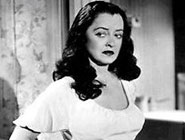|
|
|
|
Beyond
the Forest
|
 |
|
Bette Davis as Rosa Moline, a modern-day Madame Bovary – cursing, delirious, desperate for release from the prison of domesticity, a slave to her wanton desires. History records this as an absurd, minor soapie – and reads Bette's immortal line, "What a dump!", as a reflexive comment on the film itself. But history has it all wrong. Beyond the Forest is up there with the most bruising, passionate, expressionistic melodramas of Vincente Minnelli, Douglas Sirk or Nicholas Ray. Let's tale a single immortal detail, one which speaks volumes about the art of Vidor. At one point Rosa leaves her dumpy, small hometown, for the sake of a handsome lover in the big city. And there's a scene – just a detail, a moment in a scene – where Bette/Rosa sits there in a cafe, daydreaming. Since she's in the city of her dreams – Chicago – the score plays an exaggeratedly romantic rendition of the tune "Chicago, Chicago". In voice-over Rosa thinks to herself: "He's got to see me. I'm sick of life pushing me around. I'm not just a small town girl, I'm Rosa Moline." Then we hear some other, unfamiliar voice which murmurs dreamily, as if to echo her: "Rosa Moline." Then Rosa, stoked, thinks to herself again: "I'm Rosa Moline." Then that other strange voice returns, but now tinnily and harshly, as a real, off-screen sound. It drawls: "Calling Rosa Moline." The music quickly builds and abruptly halts as Rosa shakes herself out of her trance. And then she says to the first person she can find in this café: "Someone's calling my name. What do they want?" Of course, it's just a call to come to a telephone. But how wonderful it is that, in that moment of Rosa being so lost and misplaced, she can no longer tell the difference between her own inner voice and a stranger's voice-off – no longer distinguish between interior and exterior worlds, fantasy and reality, between objective perception and subjective hallucination. And it's even more wonderful that for a moment, Vidor's film, lending its music and its mixing and its mise en scène to the cause, can join in with this delirium of voice – and can take us into that delirium, as well. © Adrian Martin April 1999 |
![]()